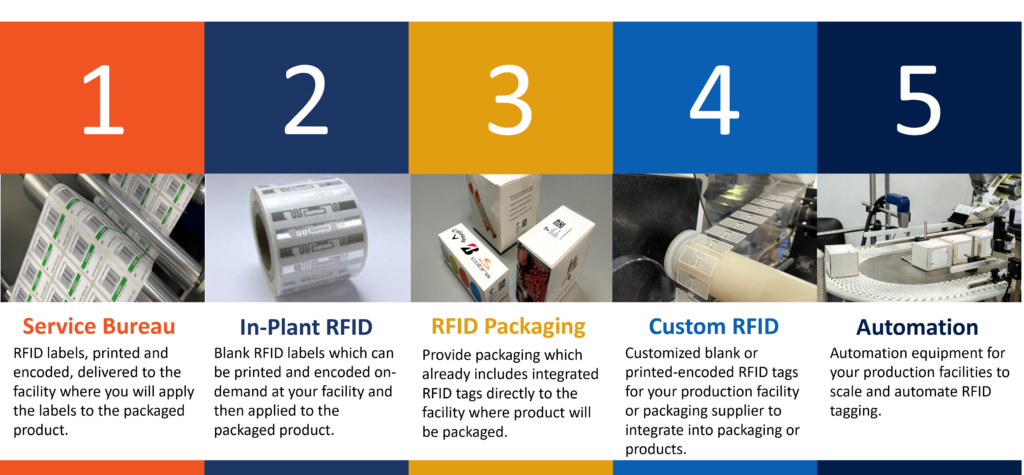
The retail industry is experiencing a change—one that technology is driving. As retailers look for ways to stay competitive and efficient, RFID (Radio Frequency Identification) has become the technology of choice. RFID technology is changing how products are tracked, from the warehouse to the store shelves. It enables retailers to ease inventory management, reduce losses, and provide a smoother shopping experience for consumers.
This shift is becoming an operational requirement for suppliers. As major retailers like Walmart, Target, and Lowe’s roll out RFID tagging requirements, it becomes increasingly important for suppliers to meet these RFID mandates. Maintaining compliance with these mandates will allow them to continue doing business with these retailers.
These RFID mandates involve meeting detailed guidelines for RFID tags, label placement, and encoding schemes. Retailers expect compliance with these requirements, and failure to do so can lead to delays, fees, rejections, and a loss of business.
This article looks into everything retailers need to know about RFID mandates and how to maintain compliance.
What Are RFID Mandates, and Why Are They Important?
RFID mandates refer to requirements set by retailers. These mandates dictate that suppliers must RFID tag products. They guarantee that all products entering the retail supply chain come with the correct RFID labels. This allows for easier tracking and real-time inventory management.
Unlike traditional barcodes, RFID tags don’t require direct line-of-sight scanning. Hence, they are more efficient for large-scale inventory management. The need for accuracy, efficiency, and real-time visibility drives the growing adoption of RFID technology across the retail sector. Retailers recognize the benefits of RFID for inventory tracking. It allows them to automate the supply chain and reduce human error. They can also gain valuable stock level data, product movement, and consumer preferences. However, suppliers must meet the specific RFID requirements outlined by each retailer to take advantage of these benefits.
The key to complying with RFID mandates is understanding the details of these requirements. From inlay specifications to tag placement and encoding schemes, each retailer has criteria that must be met. Failure to comply can lead to costly delays, rejection of shipments, and missed sales opportunities.
How RFID Mandates Impact Retail Business
RFID compliance is no longer optional for suppliers. Retailers like Walmart and Target have rolled out RFID mandates to simplify their supply chains and improve inventory accuracy.
Why are RFID mandates so important for retailers? The main reason is the technology’s ability to improve inventory management and provide real-time visibility. RFID tags enable retailers to track each item with precision. They eliminate the need for manual counts and reduce errors that can lead to stockouts or overstocking.
RFID technology also allows retailers to automate inventory replenishment. Thus, they can always stock shelves with the right products at the right time. This results in reduced operational costs, fewer lost sales, and improved customer satisfaction.
The accuracy and efficiency that RFID mandates provide also extend to more strategic aspects of retail. RFID gives retailers insights into product movement patterns. These benefits translate to a better customer experience. Products are more readily available and less prone to stockouts that frustrate shoppers.
What Do RFID Mandates Require?
To comply with RFID mandates, suppliers must follow specific guidelines. These guidelines can vary by retailer and product category. However, most mandates typically include several common elements.
First, retailers often specify the type of RFID “inlays” (the chips and antennas embedded in RFID labels) that must be used based on the product category. For example, clothing, automotive parts, or electronics may require different inlays. Meeting these requirements is important so that RFID tags can work correctly and accurately.
Retailers also dictate what information goes on the RFID labels. This includes barcodes, product identifiers, and serial numbers. The encoding scheme used to store this data on the RFID tag is equally important. Most retailers use the GS1 “SGTIN-96” encoding scheme to provide standardized product identification across the supply chain.
Another important aspect of RFID mandates is the requirement to “Permalock” the encoded data. The system prevents the data on the RFID tag from being altered after encoding. This provides a higher level of security and allows the tags to remain tamper-proof.
Finally, retailers often provide guidelines for label placement on products. This process includes specifying where the RFID tag should be placed on the item to ensure readability.
How to Comply with RFID Mandates
Thorough preparation and the right partnerships are key to successfully complying with RFID mandates. To meet each retailer’s RFID requirements, it is essential for vendors to partner with a reliable RFID packaging supplier such as FineLine Technologies who can tailor products to each brand’s unique needs, understand retailer’s specifications, and automate the processes.
It’s also important to work closely with retailers throughout the approval process, as many require sample labels for approval and often request photos of the labels placed on products. Many retailers also follow the Auburn Univeristy RFID Lab’s ALEC program approval process to ensure compliance with industry standards. Understanding the retailer’s approval process and providing accurate, well-prepared samples can help ensure a smoother compliance experience, minimizing delays and helping you meet the required specifications.
Many retailers also require quality control checks to ensure that RFID tags meet specified standards after printing and encoding. FineLine’s QCtrak app streamlines this process by quickly scanning RFID tags to verify that the data matches the corresponding UPC/EAN number and is readable by an RFID reader. QCtrak also ensures that the tags are correctly encoded, with data that matches the printed barcode and is locked to prevent tampering, providing an efficient solution for quality assurance.

The Role of FineLine in RFID Compliance
At FineLine, we provide customers with a broad selection of RFID inlays, adhesive formulations, high-quality color printing, and quality control tools to ensure RFID compliance. We possess industry expertise in data encoding standards, retail compliance requirements, and the Auburn University ALEC Program qualification process to ensure customers’ RFID tags, labels, and packaging meets the evolving compliance standards.
With the need to comply with various retailer mandates, we can help you develop a single RFID product that meets all your retailers’ requirements to streamline your tagging process. And as an approved supplier, we can print and ship RFID tags, labels, or packaging to you with the fastest turnaround time in the industry.
Additionally, with tools like FASTtrak for seamless ordering and QCtrak for quality control, suppliers can confidently manage RFID compliance. These solutions enable real-time tracking of orders and quick identification of tagging issues before products are shipped out.
For suppliers looking to optimize the process and improve the efficiency of RFID tagging, we design labels that seamlessly work with your applicator, ensuring smooth automation implementation. Additionally, we can integrate RFID tags directly into blister cards, prime labels, or carton packaging for a cleaner, more efficient design to eliminate the challenges of RFID stickering.
At FineLine, our expertise in RFID labeling, tagging, and quality control helps both retailers and suppliers succeed with RFID implementation. We offer a wide range of RFID labels and RFID tags to meet retailers’ specific needs in various industries. Our solutions help ease the RFID implementation process, so your tags are ready for approval and shipment.
With our high-quality, reliable products and advanced data management technology, you can overcome the challenges of RFID compliance. Contact us today to learn how we can help you with RFID compliance.